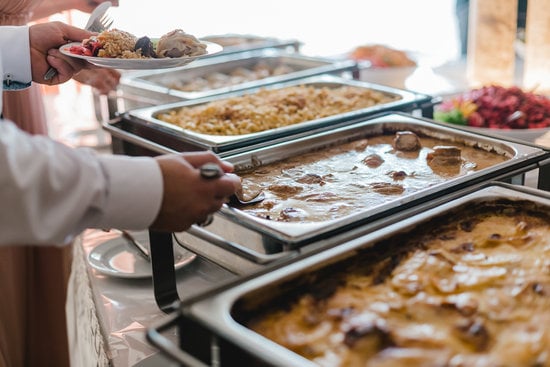When planning food for a wedding reception, one of the most important questions that couples often ask themselves is “how much food for wedding reception?” This crucial query sets the tone for a successful and satisfying dining experience for guests. There are several factors to consider when making decisions about the quantity, quality, and variety of food to serve at your special event.
Setting a realistic budget for food and catering is essential in ensuring that you can provide a memorable meal without breaking the bank. The size of your guest list will also play a significant role in determining how much food you will need to order. Whether you opt for a sit-down dinner or a buffet-style meal, it’s important to choose the right menu options that reflect your tastes and preferences as a couple.
From appetizers and hors d’oeuvres to main course portions, desserts, cakes, sweet treats, and beverages – every aspect of your wedding reception menu should be carefully considered. By selecting the appropriate quantities and varieties of dishes, you can ensure that no guest leaves hungry from your celebration. Stay tuned as we delve deeper into these factors to help you plan an unforgettable culinary experience for your wedding day.
Setting a Realistic Budget for Food and Catering
When planning a wedding reception, setting a realistic budget for food and catering is essential to ensure that you stay within your financial means while still providing a memorable dining experience for your guests. Here are some factors to consider when determining how much to allocate for food at your wedding reception:
- Guest Count: The number of guests attending your wedding will significantly impact the amount of food and beverages needed. Be sure to have an accurate headcount before finalizing your catering budget.
- Menu Selection: The types of dishes and level of service you choose will also affect the overall cost. Opting for elaborate multi-course meals with premium ingredients will naturally be more expensive than buffet-style options or simple plated dinners.
- Special Dietary Needs: Consider any special dietary requirements or preferences your guests may have, such as vegetarian, vegan, gluten-free, or kosher options. Accommodating these needs may require additional costs, so be sure to account for them in your budget.
When setting a budget for food and catering at your wedding reception, it’s essential to strike a balance between creating a memorable dining experience for your guests and staying within your financial constraints. By considering these factors and planning accordingly, you can ensure that everyone will enjoy delicious food and drinks without breaking the bank.
Guest List Size Impact on Food Quantity
When planning a wedding reception, one of the crucial factors to consider is the size of your guest list and how it will impact the quantity of food needed. The number of guests attending your wedding will directly influence the amount of food and beverages required, as well as the overall cost of catering. It is essential to have an accurate estimate of how many guests will be present to ensure that everyone is well-fed and satisfied.
Typically, catering companies provide estimates based on a per-person cost for food at a wedding reception. The more guests you have, the more food you will need to accommodate everyone. This includes appetizers, main courses, desserts, and drinks for each attendee. Ensuring that you have an accurate headcount will help you plan accordingly and avoid running out of food during the event.
To calculate how much food for a wedding reception based on your guest list size, it is recommended to work with your caterer or venue coordinator. They can provide guidance on portion sizes and quantities needed per person to ensure that no one goes hungry.
Additionally, they can help you choose menu options that are suitable for your guest count while staying within your budget. Being mindful of your guest list size and its impact on food quantity will ultimately lead to a successful and enjoyable wedding reception for all attendees.
| Guest List Size | Estimated Food Quantity |
|---|---|
| 50-100 guests | 75-150 servings per course |
| 100-200 guests | 150-300 servings per course |
| Above 200 guests | 300+ servings per course |
Choosing the Right Menu Options for Your Reception
When it comes to selecting the right menu options for your wedding reception, there are several factors to consider to ensure that your guests are satisfied and happy. One important aspect to think about is the variety of dishes you offer.
It’s essential to have a balance of different flavors, textures, and types of cuisine to cater to all tastes and dietary restrictions. You may want to consider incorporating personal touches such as family recipes or favorite dishes that reflect you and your partner’s culinary preferences.
Additionally, it’s crucial to take into account the season and time of day when choosing your menu options. For example, if you’re having a summer wedding, light and refreshing dishes may be more appropriate, while a winter wedding calls for heartier fare. The time of day will also influence your menu choices – brunch receptions may feature breakfast items like pastries and eggs, while evening receptions typically include dinner options like steak or seafood.
Another factor to consider when selecting menu options for your wedding reception is the overall theme or ambiance you wish to create. Whether you’re going for a formal sit-down dinner or a casual buffet-style meal, your menu should complement the atmosphere you want to achieve. Ultimately, choosing the right menu options for your reception is about creating a memorable culinary experience that resonates with you and your guests on your special day.
| Choosing Menu Options | Considerations |
|---|---|
| Variety of Dishes | Balance flavors, textures, and dietary restrictions. |
| Season & Time of Day | Choose appropriate dishes based on the season and time. |
| Theme & Ambiance | Select menu options that complement the overall atmosphere of your reception. |
Appetizers and Hors d’Oeuvres
When it comes to planning the appetizers and hors d’oeuvres for your wedding reception, there are a few key factors to consider to ensure that you have enough food for all your guests. One important consideration is the duration of your reception.
If you are hosting a cocktail hour before the main meal, you will need to provide enough appetizers to keep your guests satisfied until dinner is served. It’s recommended to plan for approximately 6-8 pieces per person if appetizers are the primary food source during this time.
Another factor to consider when determining how much food for a wedding reception is the time of day of the event. If your wedding is taking place during traditional meal times, such as lunch or dinner, you may need to increase the quantity of appetizers and hors d’oeuvres to account for hungry guests who may be expecting a full meal. In this case, planning for 10-12 pieces per person would be more appropriate.
Variety and Dietary Needs
In addition to quantity, it’s also essential to consider the variety of appetizers and hors d’oeuvres that you offer at your wedding reception. Providing a mix of hot and cold options, meat-based and vegetarian choices, as well as accommodating any dietary restrictions or allergies among your guests is crucial. By offering a diverse selection, you can ensure that there is something for everyone to enjoy, making for a more inclusive and satisfying dining experience.
Working With Your Caterer
Collaborating closely with your catering team or professional chef can help determine the perfect balance between quantity and variety when it comes to appetizers and hors d’oeuvres at your wedding reception. They can provide valuable insight based on their experience in catering events similar in size and style to yours.
Communicating specific preferences or themes you have in mind can help them create a customized menu that not only meets but exceeds your expectations while keeping within your budget constraints.
Main Course Portion Sizes for a Wedding Reception
When planning the main course portion sizes for your wedding reception, it is important to consider a few key factors to ensure that your guests are well-fed and satisfied. One crucial aspect to keep in mind is the type of meal service you will be offering. Whether you opt for a plated dinner, buffet-style service, or stations, each option will have an impact on how much food you will need to provide.
To help you estimate how much food to order for the main course at your wedding reception, here are some general guidelines that can serve as a starting point:
- For plated dinners, plan on serving approximately 6-8 ounces of protein per guest.
- Buffet-style service may require slightly more food, around 8-10 ounces per guest.
- If you decide on stations with multiple food options, aim for a total of 1.5 servings per guest across all stations.
It is also essential to take into account any dietary restrictions or preferences of your guests when planning the main course portion sizes. Offering a vegetarian or vegan option, as well as accommodating allergies or intolerances, will ensure that all attendees can enjoy the meal without feeling left out. Additionally, working closely with your caterer or chef can help determine the appropriate quantities based on your specific menu choices and guest count.
Desserts, Cake, and Other Sweet Treats for Your Guests
When planning the desserts, cake, and other sweet treats for your wedding reception, it is essential to keep in mind the variety of options available and how they will complement the overall dining experience for your guests. From decadent cakes to delightful pastries and everything in between, the dessert menu can truly make a lasting impression on your attendees.
Deciding on a Wedding Cake
One of the main attractions at any wedding reception is undoubtedly the wedding cake. Whether you opt for a traditional tiered cake or a more modern dessert trend like a cupcake tower or a dessert bar, consider factors such as flavor preferences, dietary restrictions of your guests, and of course, how well it aligns with your wedding theme.
Sweet Treats Beyond the Cake
In addition to the wedding cake, offering a variety of sweet treats can satisfy different tastes and preferences amongst your guests. Consider providing an assortment of mini desserts like macarons, cookies, tarts, or even a chocolate fountain for a fun interactive element. Don’t forget to include options for those with dietary restrictions such as gluten-free or vegan desserts to ensure everyone can indulge in something sweet.
Creating Memorable Sweet Moments
The desserts and sweet treats at your wedding reception not only serve as delicious offerings but also create memorable moments for you and your guests. Whether it’s cutting into the cake together as newlyweds or indulging in a late-night snack station with donuts or ice cream sandwiches, these sweet elements add an extra touch of joy to your special day.
Be sure to work closely with your caterer or baker to bring your vision to life and create an unforgettable dessert experience for all who attend.
Beverages and Bar Options
When planning the food for a wedding reception, it is essential to consider not only the menu options but also the beverages and bar options available to your guests. One of the biggest decisions you will need to make is whether to have an open bar or a cash bar at your reception. Both options come with their pros and cons, and it’s important to weigh them carefully before making a decision.
An open bar means that all drinks served at the reception are complimentary for your guests. While this can be a generous gesture that allows your guests to enjoy a wide variety of drinks without worrying about cost, it can also significantly add to the total cost of catering for your reception.
On the other hand, a cash bar requires guests to pay for their drinks, which can help control costs but may be seen as less hospitable by some guests.
To decide between an open bar and a cash bar, consider your overall budget for the reception and how much you are willing to allocate towards beverages. You may also want to take into account the preferences of your guests and whether they would appreciate having drinks included or don’t mind paying for them.
Ultimately, it’s important to choose an option that aligns with your priorities as well as those of your loved ones who will be celebrating with you on your special day.
Another alternative is offering a limited selection of complimentary drinks while others are available on a cash basis. This compromise ensures that guests have some free choices while still allowing you to control costs effectively. Whichever option you choose, be sure to communicate it clearly on your wedding invitation or website so that guests know what to expect when it comes time to raise their glass in celebration.
Calculating the Total Cost of Food and Drinks for Your Reception
Planning a wedding reception involves careful consideration of many factors, including the cost of food and drinks. To determine how much food for a wedding reception, it is essential to calculate the total cost of catering services and beverages.
The first step in this process is to set a budget that is realistic and manageable for you and your partner. Consider what type of menu options you want to provide for your guests, as well as any special dietary needs or preferences that need to be accommodated.
The size of your guest list will have a significant impact on how much food and drink you will need to order for your wedding reception. It is important to have an accurate count of attendees in order to avoid either running out of food or having excessive leftovers.
Communicate with your caterer about the estimated number of guests so they can help you plan accordingly. Additionally, consider the duration of your reception and whether you will be serving multiple courses or just appetizers and drinks.
When calculating the total cost of food and drinks for your reception, don’t forget to factor in additional expenses such as service fees, gratuities, taxes, and any rental equipment that may be needed. Be sure to ask your caterer for a detailed breakdown of all costs involved so there are no surprises when it comes time to pay the bill.
By carefully planning and budgeting for the food and beverages at your wedding reception, you can ensure that your guests are well-fed and happy throughout the celebration.
Tips for Ensuring That No Guest Leaves Hungry From Your Wedding Reception
When planning the food for your wedding reception, one of the most important factors to consider is how much food will be enough to satisfy all your guests. From setting a realistic budget to choosing the right menu options and portion sizes, there are several key aspects to keep in mind. The size of your guest list will also have a significant impact on the quantity of food needed, so it’s crucial to plan accordingly.
One way to ensure that all your guests leave your wedding reception feeling satisfied is by offering a variety of appetizers, hors d’oeuvres, main courses, desserts, and beverages. By providing a diverse selection of food and drink options, you can cater to different tastes and dietary preferences. Additionally, considering whether to have an open bar or a cash bar can also affect how much you ultimately spend on beverages for your event.
Calculating the total cost of food and drinks for your reception can be daunting, but with careful planning and consideration of your guest list size and preferences, you can create a memorable dining experience for everyone in attendance. Ultimately, following these tips will help ensure that no guest leaves hungry from your wedding reception and that they remember the delicious meal shared on such a special occasion.
Frequently Asked Questions
What Is a Good Budget for Food at a Wedding?
Establishing a good budget for food at a wedding depends on various factors such as the number of guests, the type of meal (buffet, plated dinner, etc.), and the quality of food. On average, couples typically spend around $40-$100 per person on the catering budget.
How Do You Estimate Food for a Wedding?
Estimating food for a wedding requires careful consideration of the number of guests attending, their dietary restrictions, and the type of meal service being provided. It is advisable to work closely with the caterer to create a menu that suits both your budget and preferences while ensuring that there is enough food for everyone.
How Do You Feed 100 People at a Wedding on a Budget?
Feeding 100 people at a wedding on a budget can be done by opting for cost-effective options such as buffets or food stations rather than plated dinners. Another way to save money is by choosing seasonal ingredients and limiting the number of courses in the meal.
Additionally, offering a limited bar selection or having a cash bar can also help reduce costs while still providing enough food and drinks for all guests.

I have been involved in marriages for over 20 years helping couples and singles understand more about them.





